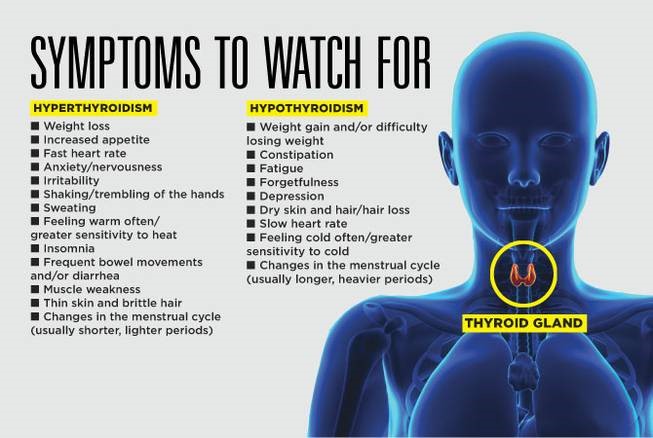Medical Conditions
Hypothyroidism

The thyroid gland is a butterfly-shaped gland that is located in the lower front of the neck, just above the collarbone. The role of the thyroid is to make thyroid hormones, which are released into the blood and then carried to every tissue in the body. In children, thyroid hormone helps to ensure that growth and development occur normally, and that the body’s energy, metabolism, heart, muscles, and other organs are working properly.
Hypothyroidism is an underactive thyroid gland. Hypothyroidism means that the thyroid gland can’t make enough thyroid hormone to keep the body running normally. People are hypothyroid if they have too little thyroid hormone in the blood. Common causes are autoimmune disease, such as Hashimoto’s thyroiditis, surgical removal of the thyroid, and radiation treatment.
Management
Children with elevated TSH and low T4 levels are treated by replacing the amount of hormone that the child’s own thyroid can no longer make. The goal is to bring the T4 and TSH back to the normal range and restore the body’s normal functions (called ‘replacement’ therapy). The majority of patients can achieve normal thyroid hormone levels by taking levothyroxine (T4 only) pills once daily.
The ideal way to take levothyroxine is on an empty stomach, at least 30 minutes before eating. However, the most important thing is to take levothyroxine in a consistent way each day, at a time that is easy to remember, and to avoid missing doses. If a dose is missed, it should be made up as soon as you remember.
There are some other medications that should not be taken at the same time as levothyroxine, including: calcium or iron supplements or vitamins.
When hypothyroidism is caused by Hashimoto’s thyroiditis, it is usually permanent. Hypothyroidism caused by surgical removal of the thyroid or radiation treatment is also lifelong. Hypothyroidism due to certain other causes (like medications or iodine) may go away if the cause can be addressed.
With the exception of needing to take a pill once daily and getting labs checked, there are no restrictions to everyday life and activities.
Once you have established the thyroxine dose right for you, TSH tests are necessary about once a year. You need to make an appointment to discuss with your physician if you:
- Feel a change in your symptoms. If your TSH turns out to be high, hypothyroidism is probably causing your symptoms. But if your TSH is normal, it means something else is causing your symptoms
- Want to change your thyroxine dose or brand, or change to taking your pills with or without food
- Gain or lose a lot of weight without changing your diet or exercise routine. For some people, even a change of 10 pounds or less can signal that something is wrong
- Start or stop taking a drug that can interfere with absorbing thyroxine, or you change your dose of such a drug (see "How your thyroxine dose is decided," above). For example, if you start taking estrogen in a birth control pill or in hormone replacement therapy, you may need to raise your dose. If you stop taking the drug, you may need to lower your dose
- Are not taking your thyroxine pill every day. It is very important to be truthful when telling your doctor how many pills you have missed. If you have missed pills but say that you have taken them as prescribed and if your TSH test is then high, your doctor may think that your hypothyroidism is getting worse and may raise your thyroxine dose
- Want to try to stop thyroxine treatment. If ever you think you are doing well enough not to need thyroxine treatment any longer, try it only under your doctor's close supervision. Rather than stopping your pills completely, you might ask your doctor to try lowering your dose. If your TSH increases, you will know that you need to continue treatment. You should never stop thyroxine treatment on your own. You must take your thyroxine every day, most likely for the rest of your life.
Follow up care
A TSH level should be checked 4 to 8 weeks after starting levothyroxine (T4) or after any change in levothyroxine dose. The goal of treatment is to keep the TSH and T4 in the normal range. How often these levels need to be checked depends on the age of the child. Older children can have these levels checked every 3-12 months until they have finished growing and going through puberty. Adults typically have levels checked once per year.
Nutrition education for Hypothyroidism
Limit foods high in soy protein, because large amounts of soy might interfere with the absorption of thyroid hormone.
Avoid excessive amounts of iodine, either in medications or supplements, as this could potentially alter your thyroid hormone level. Most iodine-rich foods, such as iodized products or fish, are acceptable.
Aim for a healthy diet that includes lots of fruits, vegetables, and whole grains.
Adopting a nutritious diet for your thyroid not only keeps you feeling good once your thyroid levels are normal, but it helps your digestive system function smoothly and your heart pump efficiently which supports healthy metabolism
Links to more information about Thyroid disorders:
https://my.clevelandclinic.org/health/diseases/8541-thyroid-diseasehttps://medlineplus.gov/thyroiddiseases.html
References
https://www.thyroid.org/hypothyroidism-children-adolescents/https://medlineplus.gov/hypothyroidism.html
https://www.thyroid.org/wp-content/uploads/patients/brochures/Hypothyroidism_web_booklet.pdf
https://www.health.harvard.edu/staying-healthy/healthy-eating-for-a-healty-thyroid
© Copyright All Rights Reserved 2022